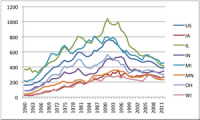-
Texas might spend up to $20 billion to protect Houston from hurricanes. Rice University says it can do it for a fraction of that.
A government plan to guard the Houston-Galveston region from deadly storm surge could cost as much as $20 billion and isn’t expected to become reality for at least 15 years. Rice University says it has a plan that could be completed faster for a fraction of the cost.
-
-
Missile Strike False Alarm Most Stressful for Less Anxious Hawaiians: Study
After learning that a warning of a missile headed to Hawaii was a false alarm, the most anxious local Twitter users calmed down more quickly than less anxious users, according to a study of tweets before, during and after the event. “Can a false alarm of an impending disaster itself be a form of trauma? Our results suggest that the experience may have a lingering impact on some individuals well after the threat is dispelled,” says an expert.
-
-
Cities Ban Government Use of Facial Recognition
Oakland, Calif., last week became the third city in America to ban the use of facial recognition technology in local government, following prohibitions enacted earlier this year in San Francisco and Somerville, Mass. Berkeley, Calif., is also weighing a ban. The technology is often inaccurate, especially when identifying people who aren’t white men.
-
-
California’s Wildfires Are 500 Percent Larger Due to Climate Change
Californians may feel like they’re enduring an epidemic of fire. The past decade has seen half of the state’s 10 largest wildfires and seven of its 10 most destructive fires, including last year’s Camp Fire, the state’s deadliest wildfire ever. A new study finds that the state’s fire outbreak is real—and that it’s being driven by climate change. Since 1972, California’s annual burned area has increased more than fivefold, a trend clearly attributable to the warming climate. “Each degree of warming causes way more fire than the previous degree of warming did. And that’s a really big deal,” Park Williams, a climate scientist at Columbia University and an author of the paper, said. Among the many ways climate change might be messing with the environment, extra heat is among the simplest and most obvious. “Heat is the most clear result of human-caused climate change,” Williams said.
-
-
Can the “Masters of the Flood” Help Texas Protect Its Coast from Hurricanes?
After centuries of fighting back water in a low-lying nation, the Dutch have become the world leaders in flood control. And their expertise is helping Texas design what would become the nation’s most ambitious — and expensive — coastal barrier.
-
-
As Feds Struggle, States Create Their Own Anti-election Propaganda Programs
As the 2020 presidential campaign heats up, individual states are ramping up education efforts to counter the threat posed by foreign disinformation campaigns to US elections. A lack of action at the federal level has prompted many states to craft their own programs designed to counter foreign efforts to undermine American democracy and educate the next generation of voters in schools.
-
-
NY State: Religious grounds no longer allowed to exempt children from vaccination
New York is the latest state where parents can no longer refuse to vaccinate children on religious grounds. Both houses of the New York State Assembly passed the measure Thursday and Governor Andrew Cuomo signed it immediately.
-
-
Texas vaccine exemption rates have reached an all-time high. Did Texas make it too easy for parents to opt out?
Texas has resisted recent attempts to change its vaccine laws, allowing parents to get their children exemptions for “reasons of conscience.” Use our lookup tool to see how exemption rates have changed in school districts and private schools across the state.
-
-
Ghost guns are everywhere in California

Feds say nearly a third of firearms recovered in California are homemade, unserialized, and untraceable. Experts say the accessibility of ghost guns is aided by a cottage industry of retailers selling nearly completed firearms that require no screening to purchase.
-
-
California hospitals to pay billions for seismic safety upgrades
California hospitals would need to make substantial investments—between $34 billion and $143 billion statewide—to meet 2030 state seismic safety standards, according to a new report.
-
-
Reducing Illinois gun violence

Illinois could reduce the number of people killed each year by gun violence by implementing ten policies supported by available research, according to a new report. The Johns Hopkins report identifies weaknesses or gaps in current Illinois law and offers recommendations to reduce gun violence.
-
-
Virginia bill would let cities ban guns from protests
The city of Charlottesville, Virginia, was powerless to prevent attendees from carrying guns at last year’s Unite the Right rally. But one of the state’s top officials, Attorney General Mark Herring, thinks he can prevent a similar situation from unfolding in the future.
-
-
Better forest management won’t end wildfires, but it can reduce the risks – here’s how
President Donald Trump’s recent comments blaming forest managers for catastrophic California wildfires have been met with outrage and ridicule from the wildland fire and forestry community. Not only were these remarks insensitive to the humanitarian crisis unfolding in California – they also reflected a muddled understanding of the interactions between wildfire and forest management. As scientists who study forest policy and community-based collaboration, here is how we understand this relationship.
-
-
Houston's urban sprawl dramatically increased rainfall, flooding damage during Hurricane Harvey
Houston’s urban landscape directly contributed to the torrential rainfall and deadly flooding experienced during Hurricane Harvey in August 2017, according to Princeton and University of Iowa researchers. The researchers report that Houston’s risk for extreme flooding during the hurricane — a category 4 storm that caused an estimated $125 billion in damage and killed 68 people — was 21 times greater due to urbanization.
-
-
After historic Texas flooding, officials will likely open more floodgates on Central Texas dam
Across Central Texas and the Hill Country, heavy rain has led to catastrophic flooding in the past week. With more rainfall in the forecast, state and local officials are working to manage floodwaters before they move downstream. After the wettest September in Texas history, multiple Central Texas reservoirs are completely full. That has forced officials to consider releasing a historic amount of water down the Colorado River.
-
More headlines
The long view
Smaller Nuclear Reactors Spark Renewed Interest in a Once-Shunned Energy Source
By David Montgomery
In the past two years, half the states have taken action to promote nuclear power, from creating nuclear task forces to integrating nuclear into long-term energy plans.
